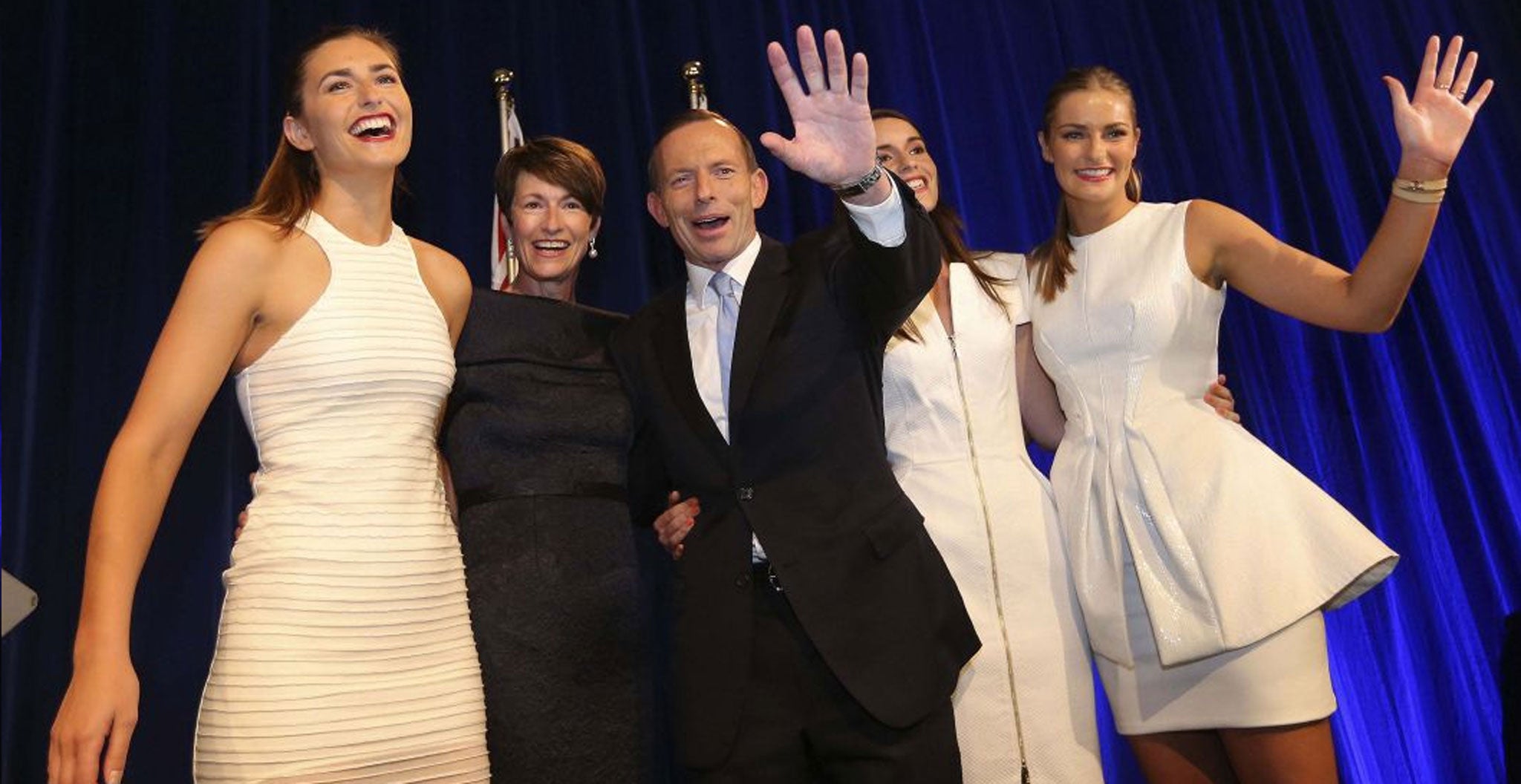Tony Abbott's Australia: conservative, less green, more mean
The new Prime Minister has indicated his planned direction and won praise from David Cameron and Rupert Murdoch

Today began like any other day for Tony Abbott, with an early-morning bike ride. Following that, Australia’s 28th (and almost certainly fittest) Prime Minister swapped the lycra for a business suit and headed to his Sydney office for briefings from senior civil servants.
Mr Abbott, who will be sworn in early next week, made clear he intends to hit the ground running after his Liberal-National Coalition scored a resounding victory over Kevin Rudd’s Labor Party on Saturday night. His wife, Margie, who was photographed returning to the family home in Sydney laden with groceries, described their new situation as “a little surreal”.
At least 15 former Labor MPs, meanwhile, were contemplating a life after politics. The party itself began a quest for a new leader, after Mr Rudd announced his resignation.
A devout Catholic and a ruthless political operator, Mr Abbott, 55, was congratulated by fellow leaders including David Cameron, who tweeted that “it’ll be great working with another centre right leader” – and also by Rupert Murdoch, whose Australian papers gave him strident support during the election campaign.
Mr Murdoch tweeted that the public was “sick of public sector workers and phony welfare scroungers sucking life out of [the] economy”.
Despite a lower house majority of about 30 seats, Mr Abbott faces significant obstacles as he seeks to abolish an unpopular carbon tax and stem the flow of asylum-seeker boats – the first items on his to-do list.
Until next July, the Coalition will be forced to deal with a hostile Senate where the Australian Greens hold the balance of power. Then, when the newly elected senators then take their seats, it will have to negotiate with up to eight independents and representatives of minor parties in order to get legislation passed.
The latter will not include Julian Assange, who – along with other candidates of his WikiLeaks Party – failed to win any seats. They may, however, include two members of the Palmer United Party, which is led by the colourful mining magnate Clive Palmer. And Mr Palmer himself may yet confound the pundits by becoming Australia’s wealthiest MP; the result was so close in the Queensland seat he contested that votes are being re-counted.
As well as an obstructive upper house, Mr Abbott may face internal challenges. Although his Liberal Party remained unified and disciplined in opposition, cracks are likely to appear between its conservative and liberal wings now that it has gained power.
Some colleagues are opposed to his A$5.5bn (£3.23bn) paid parental leave scheme, regarding it as overly generous. There are also rumblings, particularly in the rural-based National Party, the minor coalition partner, about China buying up farmland and about foreign investment in Australian companies. Right-wingers want industrial laws reformed to favour employers. Meanwhile, the economy is slowing as a decade-long mining boom wanes.
If Mr Abbott’s poll ratings begin to fall, a powerful challenger will be waiting in the wings: his popular communications minister, Malcolm Turnbull, whom he ousted – by a single vote – as party leader in 2009.
Many outside observers were speculating today about how Australia will change under Tony Abbott. First, it will become a little meaner. Mr Abbott plans to slash foreign aid by A$4.5bn and turn back asylum-seeker boats in mid-ocean. It will also become less green. The new prime minister will do less to combat climate change than Mr Rudd, who didn’t do much.
It will become more introspective. Unlike Mr Rudd, a former diplomat and foreign minister, Mr Abbott is not greatly interested in foreign affairs. And it will become more socially conservative. He is opposed to abortion, same-sex marriage and stem-cell research. Mr Abbott also believes the history curriculum needs to be rewritten to focus more on the country’s European heritage and less on past mistreatment of Aborigines.
Boxing Blue: A political life
An MP since 1994, Tony Abbott was a minister for nine years in the government of his Liberal predecessor, John Howard”.
Born in London in 1957, he grew up on Sydney’s leafy north shore, attending a prestigious Jesuit college. At Sydney University, where he studied politics and philosophy, he waged a campaign to break the leftists’ domination of the student organisation.
After a spell at Oxford as a Rhodes scholar, where he earned a boxing blue, he entered a Catholic seminary in Sydney. However, he left and married Margaret Aitken, a New Zealand-born former teacher. After dabbling in journalism, he entered federal parliament.
The Liberal Party fell into disarray after Mr Howard was toppled by Kevin Rudd in 2007. Mr Abbott, who was elected leader in 2009, transformed its fortunes, seeing off Mr Rudd and narrowly missing out on the premiership in 2010, when a hung parliament gave way to a Julia Gillard-led minority government.
Join our commenting forum
Join thought-provoking conversations, follow other Independent readers and see their replies
Comments
Bookmark popover
Removed from bookmarks